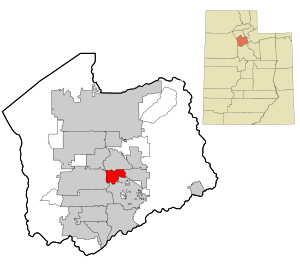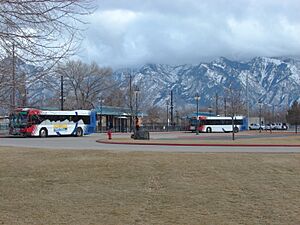Midvale, Utah facts for kids
Quick facts for kids
Midvale City, Utah
|
|
|---|---|

Location in Salt Lake County and the state of Utah
|
|
| Country | United States |
| State | Utah |
| County | Salt Lake |
| Area | |
| • Total | 5.91 sq mi (15.32 km2) |
| • Land | 5.91 sq mi (15.32 km2) |
| • Water | 0.00 sq mi (0.00 km2) |
| Elevation | 4,383 ft (1,336 m) |
| Population
(2010)
|
|
| • Total | 27,964 |
| • Estimate
(2019)
|
34,124 |
| • Density | 5,770.04/sq mi (2,227.74/km2) |
| Time zone | UTC−7 (Mountain (MST)) |
| • Summer (DST) | UTC−6 (MDT) |
| ZIP code |
84047
|
| Area code(s) | 385, 801 |
| FIPS code | 49-49710 |
| GNIS feature ID | 1430307 |
Midvale City is a city in Salt Lake County, Utah, United States. It is part of the larger Salt Lake City metropolitan area. In 2019, about 34,124 people lived in Midvale.
Midvale is a busy place with two main areas. The Shops at Fort Union are on the east side, offering many places to shop. On the west side, you'll find the Bingham Junction area, which is a big business center. Midvale is in the middle of Utah's most populated county. It is also crossed by a major highway called Interstate 15. The city is special because it has two direct TRAX light rail lines and three TRAX stations, making it easy to travel around.
Contents
Geography
Midvale covers about 5.8 square miles (15.1 km2) of land. The Jordan River forms the western edge of the city.
Climate
Midvale has a climate with big changes between seasons. Summers are warm to hot, and winters are cold. This type of weather is called a humid continental climate.
| Climate data for Midvale, Utah | |||||||||||||
|---|---|---|---|---|---|---|---|---|---|---|---|---|---|
| Month | Jan | Feb | Mar | Apr | May | Jun | Jul | Aug | Sep | Oct | Nov | Dec | Year |
| Record high °F (°C) | 64 (18) |
70 (21) |
80 (27) |
87 (31) |
107 (42) |
110 (43) |
108 (42) |
107 (42) |
100 (38) |
92 (33) |
78 (26) |
66 (19) |
108 (42) |
| Mean daily maximum °F (°C) | 38 (3) |
44 (7) |
53 (12) |
64 (18) |
73 (23) |
84 (29) |
93 (34) |
91 (33) |
81 (27) |
67 (19) |
51 (11) |
41 (5) |
65 (18) |
| Mean daily minimum °F (°C) | 17 (−8) |
23 (−5) |
29 (−2) |
36 (2) |
43 (6) |
50 (10) |
58 (14) |
57 (14) |
47 (8) |
37 (3) |
27 (−3) |
21 (−6) |
37 (3) |
| Record low °F (°C) | −25 (−32) |
−19 (−28) |
−4 (−20) |
11 (−12) |
22 (−6) |
30 (−1) |
35 (2) |
36 (2) |
18 (−8) |
10 (−12) |
−16 (−27) |
−22 (−30) |
−25 (−32) |
| Average precipitation inches (mm) | 1.2 (30) |
1.3 (33) |
1.6 (41) |
1.8 (46) |
1.4 (36) |
0.9 (23) |
0.7 (18) |
1 (25) |
.8 (20) |
1.4 (36) |
1.3 (33) |
1.4 (36) |
14.7 (370) |
| Source: weather.com | |||||||||||||
People Living in Midvale
| Historical population | |||
|---|---|---|---|
| Census | Pop. | %± | |
| 1910 | 1,760 | — | |
| 1920 | 2,209 | 25.5% | |
| 1930 | 2,451 | 11.0% | |
| 1940 | 2,875 | 17.3% | |
| 1950 | 3,996 | 39.0% | |
| 1960 | 5,802 | 45.2% | |
| 1970 | 7,840 | 35.1% | |
| 1980 | 10,146 | 29.4% | |
| 1990 | 11,886 | 17.1% | |
| 2000 | 27,029 | 127.4% | |
| 2010 | 27,964 | 3.5% | |
| 2020 | 36,028 | 28.8% | |
| U.S. Decennial Census | |||
In 2020, about 36,028 people lived in Midvale. Most people are non-Hispanic White (about 76.9%). Other groups include Hispanic or Latino (23.6%), Hawaiian or Pacific Islander (4.3%), and Black or African American (3.4%).
About 64.5% of Midvale's population is between 18 and 65 years old. Around 27% of the people are under 18, and 8.5% are over 65. Slightly more than half of Midvale's population (49.7%) is female.
Education
Midvale has schools managed by the Canyons School District. This district started in 2009 after the Jordan School District was split into two.
Midvale has four elementary schools: Copperview, East Midvale, Midvale, and Midvalley. There are two middle schools: Midvale Middle School and Union Middle School. The city also has one high school, Hillcrest High School.
Media and Movies
The Midvale City Journal is a newspaper that comes out once a month. It shares local news about sports, schools, city government, and daily life in Midvale.
Some movies and TV shows have filmed scenes in downtown Midvale. These include the mini-series The Stand and movies like Halloween 4: The Return of Michael Myers, Gentlemen Broncos, and The Sandlot. An old-fashioned drugstore called Vincent Drug was used in some of these films. It closed in 2003.
History
Midvale is in the middle of the Salt Lake Valley, near the Jordan River. This made it a good spot for early settlers in Utah. People started building homes here in the 1850s. One of the very first homes is still standing today.
The population grew fast in the 1870s. This was because of its central spot, the use of railroads, and its connection to mining in Bingham Canyon. The western part of Midvale became an important industrial area. The eastern part of Midvale provided farms and homes for the growing population.
Becoming a City
People likely called the area "Midvale" because it was in the middle of the valley. In 1909, Midvale officially became a city. In 1910, it had 1,760 people.
City Growth
Fort Union
Fort Union was an early settlement on the eastern side of what is now Midvale. When Midvale grew and included Fort Union, it added more people and also the Shops at Fort Union. These shops offer places to shop and offices for businesses.
Bingham Junction
Bingham Junction is on the western side of Midvale. It used to be a site for mining waste until 1958. The land had a lot of lead and other metals, making it unusable. With help from the EPA (Environmental Protection Agency), the area was cleaned up. It was removed from the list of polluted sites in 2006.
After the cleanup, Bingham Junction changed a lot. Many new homes were built. Big companies like Overstock, CHG, and Savage moved their main offices here. Other companies, including Marriott and Zagg, also opened operations. Fun places like Top Golf also came to the area. The EPA sees this as a big success. By 2018, there were 56 businesses and over 2,600 jobs in Bingham Junction.
Bingham Junction also has a stop on the TRAX light rail red line. This line connects the western part of Salt Lake County to the University of Utah.
Jordan Bluffs
Following the success of Bingham Junction, another area called Jordan Bluffs is also being redeveloped. Jordan Bluffs is south of Bingham Junction and was also part of the old mining waste site. It covers 351 acres in the southwest part of Midvale.
Jordan Bluffs is just starting its redevelopment. Plans suggest it could have 3,500 new homes and over 1,000,000 square feet of office space in the next ten years.
Transportation
Roadways
Midvale uses a grid system for its roads, like the rest of Salt Lake County. I-15 runs through the middle of Midvale. Another highway, I-215, connects with I-15 in Midvale.
Bus Service
The Utah Transit Authority (UTA) runs a bus system in Midvale. Bus routes connect to light rail stations, shopping areas like the Shops at Fort Union, and office parks. There's even a special bus route for skiers that runs along 7200 South.
Light Rail
UTA's TRAX light rail system has two lines that serve Midvale: the Red Line and the Blue Line. The city has three light rail stations:
- Bingham Junction (Red Line)
- Midvale Fort Union (Blue Line)
- Midvale Center (Blue Line)
Economy
Several companies have their main offices in Midvale. These include CHG Healthcare Services, Arctic Circle Restaurants, Veritas Funding, LLC, Sportmans' Warehouse, Zagg, and Overstock.com.
School Improvement Network, a company that helps schools, moved its main office to Midvale in 2011.
Notable People
Many interesting people have connections to Midvale:
- Corbin Allred – An actor.
- Zane Beadles – An NFL football player.
- Mary N. Cook – A leader in the Young Women organization of The Church of Jesus Christ of Latter-day Saints.
- Richard Dutcher – An actor, director, writer, and producer.
- J. Thomas Fyans – A General Authority for The Church of Jesus Christ of Latter-day Saints.
- Gregg Hale – A guitar player for the band Spiritualized.
- Christen Jensen – An educator and college president.
- Don L. Lind – A scientist, naval officer, and NASA astronaut.
- Dick Motta – A basketball coach for college and NBA teams.
- Kent Ryan – A former NFL football player.
- Josh Savage – A former NFL football player.
- Scott Young – A former NFL football player.
See also
 In Spanish: Midvale (Utah) para niños
In Spanish: Midvale (Utah) para niños


